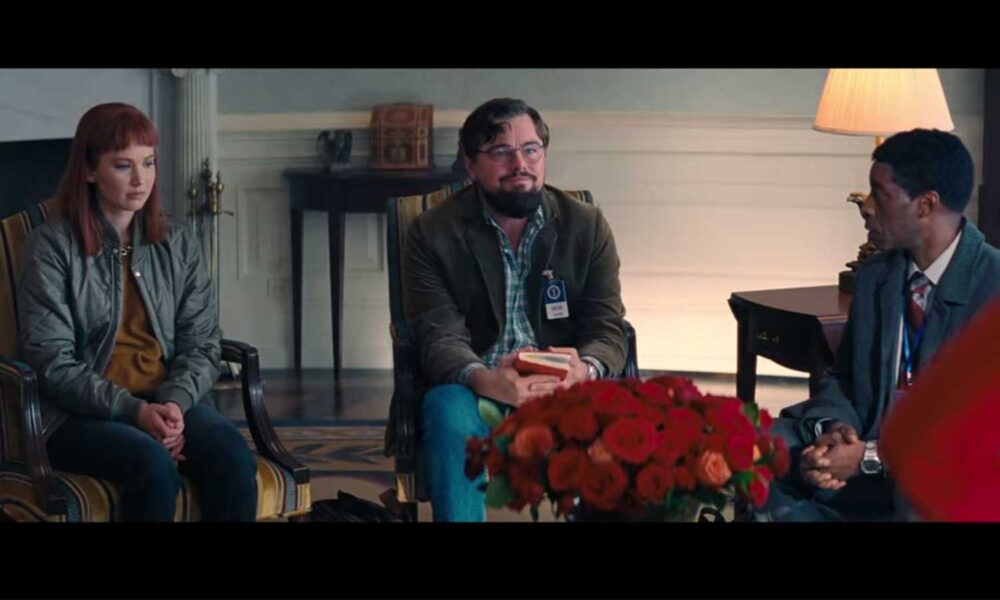A little more than three months on from its release, Netflix’s Don’t Look Up is generating buzz yet again as an Oscar nominee several times over, including for best picture. At first glance Don’t Look Up is a satire about climate change. It’s also a commentary on the dysfunctional state of our government. I began to write this post weeks ago because I wanted to add a different dimension to the chorus of comparisons between the film and existential threats to humanity. I wanted to write about the analogies to nuclear weapons and how “looking up” might stir more of us to take action to prevent catastrophic nuclear war. I wanted to write about the white supremacy in American politics represented in the film and how real-world nuclear weapons have the same problem.
Then, spoiler alert: it all got too real.
The Russian government invaded Ukraine in February creating a war, humanitarian crisis, and global threat all at once. Vladimir Putin threatened the world with nuclear weapons while murdering civilians, including children, in Ukraine. We don’t need to look to a film to demonstrate the frustrating and potentially deadly reality that our governments have ignored solutions to an existential problem for too long. Make no mistake, the Russian government is the aggressor in this current war and global crisis, but the United States could have done much more to prevent this situation from ever happening.
Many of us, maybe even most of us, are paying attention now. Putin’s war and threats dominate news coverage across the spectrum of outlets. Experts on global security and nuclear weapons are being listened to on the airwaves. The real-world media treatment of experts has been, at times, better than Don’t Look Up portrayed. Nuclear weapons have even made their way to the top of social media lately, with “nukes” trending on Twitter. We’re paying attention. We are looking up. Does it matter?
The world’s population in Don’t Look Up finally looked up when the comet was visible to the naked eye in the sky. The threat was near, imminent, and unavoidable. By the time a critical mass of human beings bothered to look up, the opportunity to change the outcome had come and gone. The two hero scientists died right along with the guy who thought shooting at the comet was a good idea. In Don’t Look Up, being right wasn’t enough. Sharing the truth wasn’t enough. Last-minute widespread recognition of the threat wasn’t enough. I propose to you, dear reader, that’s true of our real world too.
Our comet isn’t a comet. It is a dictator with a nuclear arsenal at his disposal, who has proven willing to kill indiscriminately. But that is just the comet we currently see hurtling toward earth. We actually have an entire asteroid belt of our own creation, sitting on our planet in the form of nuclear weapons. We’ve been lucky for the past few decades not to have lived under an articulated threat of nuclear war. But the threat never really went away, we just weren’t looking up.
Despite the state of our world, President Biden is poised to backtrack his support for a “No First Use” policy. In other words, the US will not commit to not starting a nuclear war…or to not being the comet that sparks our destruction. This is not a matter of knowing the solution. Biden didn’t shy away from saying the right thing on the campaign trail. Yet again, Don’t Look Up tracks right alongside reality. The hero scientists in the film did everything right: they ran a grassroots campaign, media campaign, got a pop star to amplify the message—they even got a meeting with the President in the Oval Office. Nothing changed. All those efforts, which by any metric were successful at the highest level, were not enough to change the government’s response or ultimate outcome.
Don’t Look Up reinvigorated the conversation about existential threats to humanity. It caused many of us to “look up” for the first time, or the first time in a long time. Then the world shook and our satirical comet became another real threat. This weekend we will turn our attention back to fiction for a brief moment. We will watch for Don’t Look Up to be validated by the entertainment industry at the Oscars. But the value of the film was never in its award worthiness. It was a timely push to look up and acknowledge the threats we face. Now we are—we are looking up—and that’s a step in the right direction. Only looking up can’t save us. Let’s take more steps before it is too late.

